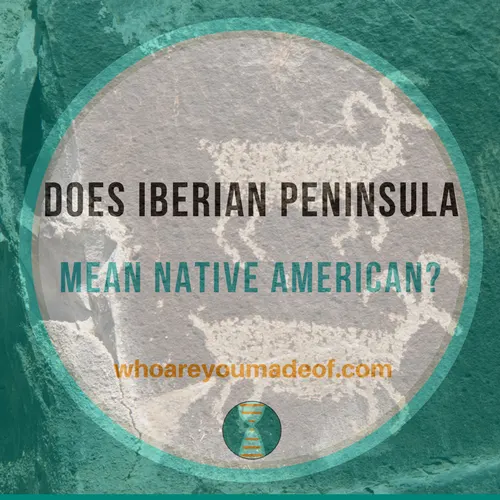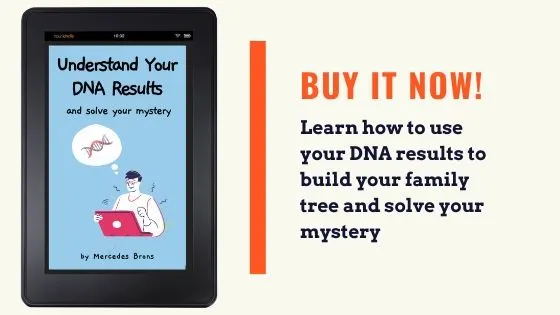Many people are puzzled when they get their Ancestry DNA, 23 and Me, or Family Tree DNA results back and see that they have a percentage of Iberian. A question that sometimes comes to mind, especially because of some misinformation that has been spreading online, is whether or not having Iberian ethnicity also means that someone is Native American.
In this post, you will learn:
- Whether Iberian is Native American
- A little about appearance and Iberian DNA
- What it really means to have Iberian ancestry

Don't forget! Check out my DNA Tools Page to find all of my most helpful blog posts and other great resources to assist you in learning as much from your DNA results as possible.
Does Iberian Peninsula mean Native American?
The answer to this question is a resounding "no". The native peoples of the United States, and other North American countries, had no DNA connection to those of the Iberian Peninsula before the arrival of Europeans about 500 years ago.
If you have Iberian in your DNA results, it simply means that you have ancestors who lived on the Iberian Peninsula at some point - though it could have been a very long time ago, and you might not be able to trace your family back that far.
An important item to mention: If you have Iberian Peninsula and you have Native American on your results, there are a few common reasons that this might have happened.
You might have ancestors who descend from Spanish-speaking North or South America, who could likely have had both Native American and Iberian admixture. But just because you see both Iberian and Native American, it doesn't automatically mean you have Hispanic heritage, as some people say.
It could also be that you have Native American ancestors from the US, along with European ancestors who descended from countries with a high Iberian percentage.
- Iberian Peninsula DNA and Colonial Ancestors
- Is Iberian Plus Native American Hispanic?
- Does Ancestry DNA test for Native American?
- Why doesn't Native American show up in my DNA results?
Appearance: What do Iberians look like?
This question leads me to the discussion of the reason that many people do a DNA test in the first place. They are wondering if their olive skin, dark eyes, and dark hair mean that they have Native American ancestry.
I'm not judging - I promise. We had a very similar situation in our family, and boy were we surprised by what we found using DNA.
Finding Iberian DNA in test results might lead some people to try to find out what Iberian people look like, in order to find some sort of explanation for their looks. If their olive-toned complexions cannot be explained by having Native American ancestry, then maybe it comes from the Iberian?
While there is no "typical" way that someone from the Iberian Peninsula "looks", you could just take a look at the geography of the region in order to get an idea of the types of features that are common to people native to the region. Spain, which is the biggest country on the peninsula, is separated from Morocco (North Africa) by the Strait of Gibraltar.
In addition, Spain lies close to France, which is connected by land to Italy. There has also historically been trade and travel with Italy.
What it really means to have Iberian ancestry
If you have found Iberian ancestry in your DNA results, you might be wondering what it really means. There is no easy answer to this question, but I will give you a list of possibilities.
In order to determine which situation most closely applies to you and your family, you will have to take a good look at your family tree (and start building one if you haven't already).
Here are some ideas on how you might have inherited the Iberian ethnicity:
- You have a relatively recent ancestor from Portugal, Spain, France, or Italy
- You have many ancestors with Iberian ancestry, common in the United States as well as Latin American countries
- You are of Hispanic descent
- You are of French-Canadian descent
- You are descended from families who have long histories in French Louisiana
- A combination of the above, or something different
As you can see, there are all sorts of explanations as to why you might have inherited the Iberian Peninsula ethnicity. In order to really know, you will have to do some of the more traditional research and see where it leads you.
I like building my family trees on Ancestry, and it's easiest to use with a subscription (you can get a two-week trial by using this sponsored link: Ancestry Free Trial )
Read more on this:
Conclusion
I hope that this post has helped explain a little bit about whether Iberian Peninsula means Native American, and what it really means to have Iberian Peninsula DNA. If you have any questions or comments, or would like to share your story about when you found Iberian Peninsula in your DNA results, I would love to hear from you in the comments.
Thanks for stopping by!


ragged-gothic
Saturday 24th of September 2022
Iberian is a complicated term, and seems to be used in different contexts to describe unrelated peoples. There is "Iberian" as relates to the Iberian Peninsula, where the word descends from Hiberia and is related to the name of the river Ebro. There is also the ancient kingdom of Iberia which was located in the eastern Caucasus, now part of the nations of Georgia and Azerbaijan. There is also the term "Iberian" one comes across in older histories, ethnographies, and anthropological works, which refers to the "pre-Celtic" inhabitants of the British Archipelago. So far as I can tell, none of these usages are related, but I could have missed connecting information. Also, you might add that the reasons for genetic connexion between Italy, France, and the Iberian Peninsula include both the spread of Celtic language speakers into all of these regions in pre-Antiquity, and the later conquest of all of them by the Roman Empire, both of which created opportunities for gene flow throughout these adjoining regions.
Philip Quarrier
Thursday 17th of March 2022
There is a similarity between the Iberian Peninsula (Portugal and Spain) and Britain:
Both were Celtic populations invaded by Romans and Germans. People on TVE television from Spain look much like British and not at all "Hispanic".
Shelly C
Friday 23rd of October 2020
I'm confused, the website called access genealogy reports that extensive DNA sampling has been done on the western North Carolina Cherokee tribe and that they have shown high percentages of Iberian peninsula DNA. So, while Iberian peninsula DNA in itself is not native American, if that DNA was mixed with that tribe 500 years ago, and somebody descended from that tribe in the last 500 years, like myself, couldn't the Iberian peninsula showing up in my genealogy test reflect my native American ancestry? My great-grandmother was half-blooded Cherokee, I know this from the paper trail. Her father was full-blooded and we have documents to prove he was killed in a battle with the US army. But there's nowhere on the genealogy test that says we're any percentage of native American. But the genealogy test does say we're 14% Iberian peninsula. My great-grandparent and great-great-grandparent come directly from the western North Carolina Cherokee tribe. So how can you give a resounding no to the answer about the Iberian peninsula DNA not reflecting native American heritage? At best I would have to say the answer is very complicated. Just my humble opinion.
Aaron
Saturday 29th of April 2023
@Shelly C, really interesting, I see your point.
Jimmy Headen
Saturday 22nd of August 2020
My late Grandfather on my Fathers side claimed to be in large part Cherokee, his wife also claimed part native heritage? Looking at some members of my family I couldn't help but acknowledge the statement as fact. My Grandfather has the last name Chavis, my Grandmother has the maiden name, Strickland. There are people related to me on MyHeritage through my Great Grandmother on my Fathers side, due to the fact I can find no one with the names -Chavis or Strickland as DNA matches, I had the thought my Father might not my Father? until I found the matches mentioned above, associated with my Greatgrandmother. I have DNA 14.3% Iberian 4.7% Italian. Still researching.
Tipton Family
Friday 19th of January 2018
I have a burning question about Native American DNA. Family lore tells us that grandma was half Cherokee, yet grandchildren show no Native American DNA! It has caused a lot of heartache and strain. At first I thought it could be the Iberian they do have, but this says no. Any thoughts on how our DNA tests could have missed it? Grandma at half should show up in grandkids, I would think. Thanks!
Philip Quarrier
Thursday 17th of March 2022
@Mercedes, I like Loretta Lynn's ancestral claim: "Scotch-Irish and Cherokee"
Mercedes
Friday 19th of January 2018
Hi! Thanks so much for your comment and for reading the article. I am really sorry that you didn't see the Native American in the ethnicity results as you expected to. First, I would like to say that the grandmother very well might have been a member of the Cherokee Nation, even if she wasn't "100%" Native American. The only way to know for sure if to follow her paper trail. I would recommend trying to locate her parents, grandparents, and great-grandparents on available census records, paying close attention to where they live, and how they are identified (racially) on the census. Also, check the Dawes rolls for her ancestors to see if they were registered (though many were not). If the grandmother has any other living siblings, it is worth asking them if they will test, since it's possible that she just didn't inherit any of the Native American ethnicity. So many people feel discouraged by the ethnicity tests not showing Native American ancestry, but don't give up hope - see where your more traditional research takes you. Good luck!